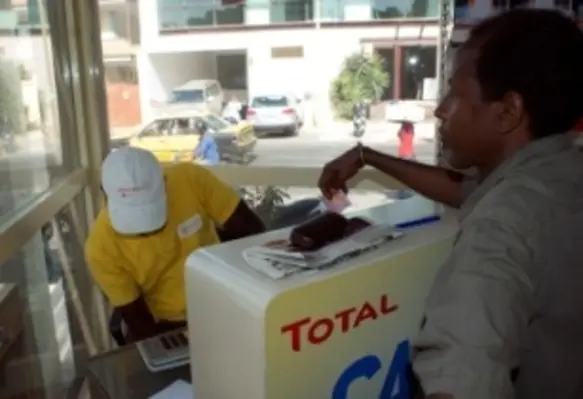Page 2 of 4
Sending money between African countries can be even more expensive in terms of the fees charged, in some cases more than 20 per cent of the sum, depending on the amount sent and its origin and destination.
When asked about Wari’s fees, Kabirou Mbodje, the founder and chief executive of Cellular Systems International who developed the Wari gateway, told African Review that they use the other companies as benchmarks and always offer a less expensive money transfer service.
We talked for a while about how the Wari story began, and his own background. Mbodje describes himself as a 'cosmopolitan African'.
“I was born and raised in France,” he explains. “When my parents decided to move to Senegal [his mother was from Senegal, his father from Niger], I went back to France for my telecom engineer diploma and then I went to Columbia University in the US.
“I decided to come back to Africa because I wanted to do a lot of things here, something in telecoms and television, together on one platform.” And he was to get his wish.
“I developed a platform for Afrovision, a news exchange platform for Africa’s national TV and radio stations,” he says. “Then I started working in the telecom industry. I also launched a national TV station in Gambia and in Ghana before joining my wife’s uncle’s company, Telecel, now MTN.”
Then followed a number television projects, but finally he went back to Paris and was hired by Havas part of the Vivendi conglomerate, a big Africa telecoms player. Mbodje was also advising the former Senegal president, Abdou Diouf.
“I always wanted to do something for Africa integration, so in 2002 I launched a pan-African TV concept, that incorporated TV and internet, leveraging a new technology called the Microwave Multipoint Distribution System.
“It is essentially wireless cable,” he says. “I pioneered the technology in Africa, starting in Senegal. Now it is all over Africa. Every country is using that technology.”
But Mbodje ran into problems as he was stepping on the toes of the incumbent broadcasters who saw him as a potent threat; and he was, in his own words, “too small compared to bigger companies. I got crushed by the South African and French TV companies who had the same goals for Africa”.
Not a man to be knocked down for long, Mbodje started to work on developing other projects. It took two years to bring to fruition, but by 2008 he was ready to build the Wari brand. In many West African languages, Wari is the name for money.
“I started Cellular Systems International by building a sophisticated platform with simple services to send and receive money, pay bills, etc. from everywhere in the cheapest way,” he remarks.
So what exactly does the Wari gateway charge for money transfers?
“It all depends,” Mbodje explains. “It’s changing all the time and we do not have a fixed price. It all depends on the market, it depends on the corridor and it depends on the intermediaries. So, those are the three parameters to define the pricing. But what I say is that we make sure that is the lowest cost.
“If I can give you just one example, before we arrived on the market, to send even a dollar in Senegal you had to pay US$7 to US$8. We came in and then we made sure that if you want to send a dollar, you are just pay a tenth of a dollar, just US$0.10.”
Mbodje also made the point that with pan-African or international money transfers, Wari does not speculate on the forex element of the transaction, nor charge a forex commission. That is somewhat at variance with common practice within the industry, but a very welcome departure for the consumer.
These two aspects of Wari’s approach, low cost and forex commission free, may be some of the secrets of Wari’s meteoric rise, but as I was to learn, they are only part of the company’s unique selling point that has made it the most popular money transfer service in Senegal and a leading pan-African player.
Wari has more than 80 per cent of the money transfer market in Senegal, and the number of users is growing at a rate of 20–25 per cent per a month. Wari conducts more than 250,000 transactions a day.
While at present, only 20 per cent of the African market has access to basic banking services, with Wari’s business model that figure could increase to 70 per cent.
Article continues on page 3...






















